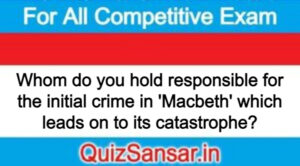
Whom do you hold responsible for the initial crime in ‘Macbeth’ which leads on to its catastrophe?
Whom do you hold responsible for the initial crime in ‘Macbeth’ which leads on to its catastrophe?
Ans.
The murder of Duncan is the first crime in the play that leads on to several others which collectively bring on the catastrophe. It is important to determine who is responsible for this initial crime. The point is raised because the murder of Duncan is laid at the door of three agents-the weird sisters. Macbeth and his wife. It is possible to argue that the murder was instigated by the prophecy of the witches who prophesied kingship to Macbeth. That kingship could not come without killing the King Duncan, Macbeth of course could have waited till Duncan’s natural death. In fact he first thinks of leaving the mater to fate and chance. But this is not followed. He kills the king as if he wished to force fate to fulfil itself. And the witches, have only foretold his future: they did not suggest to Macbeth the means of getting kingship. That was his own affair. Hence we eliminate the witches as having any responsibility in this matter. They at best confirmed his royal ambition, and did not create it.
Lady Macbeth seems to be the person responsible for the deed. She it is who compels Macbeth to commit the crime. She arranges everything and drives her husband to Commit deed by all sorts of persuasion, threats, cajoling and flattering. It would, therefore, appear that it is she who is responsible for the crime. We feel that Macbeth could not have done it but for the drive and energy of his wife, who literally pushed him on to commit the murder of King Duncan. But though there is some truth in this, it is not the whole truth.
Macbeth is by himself responsible, morally responsible, for the murder of Duncan. The thought of murdering Duncan come first to Macbeth. His wife only cooperated. Thought precedes deed and Macbeth nursed the evil thought of murdering Duncan when he was returning from his victory and met the weird sisters. He himself confesses this. In that ‘aside’, which he speaks after the prophecy of the witches, he refers to the ‘fantastical’ murder of Duncan which was beginning to assert itself in his thoughts. “Why do I yield to that suggestion?” he questions his better self, the suggestion of this evil self, his ambitious self which sowed the seed of treason in his self which his wife only watered and helped to grow. His wife also reminds him this fact-namely that it was he who wrote to her about murdering Duncan. We have no doubt left in us in this regard. It was Macbeth and Macbeth alone who first thought of murder and permitted himself to be driven to put that thought into deed, since he was weak-willed and vacillating.
Macbeth’s later crimes confirm this. He was driven to these by his own tendency to evil, of which he was a greater share than his wife. One murder was enough for her remorse to set in, but not so for Macbeth. He is convicted as a weak-willed man who cannot oppose his criminal tendencies which his vaulting ambition feeds and his fears intensify If the first crime was dictated by ambition, the later ones were dictated by fear. In either case, it is he who is morally responsible for them.
-
Write the critical appreciation of the poem No. 12 entitled Far Below Flowed.
-
Write the critical appreciation of the poem No. 11 entitled Leave this Chanting.






